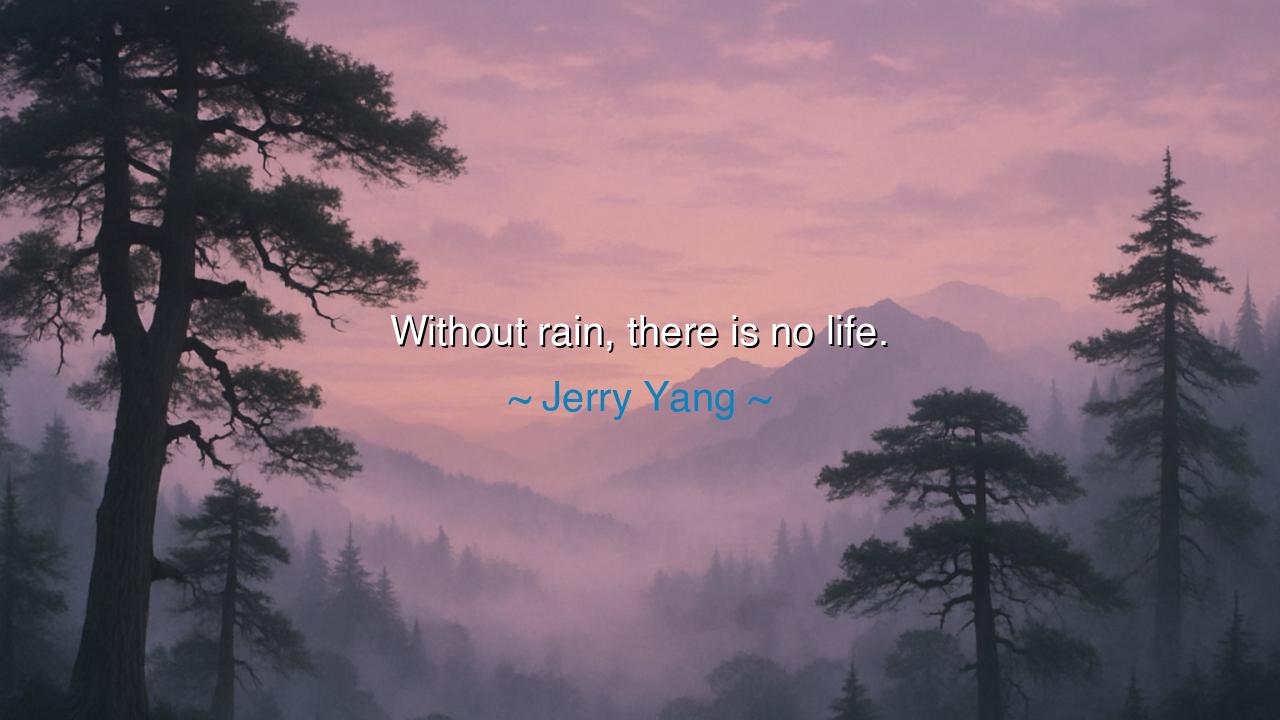
Without rain, there is no life.






"Without rain, there is no life." These words from Jerry Yang are not just a reflection on the physical world, but a profound metaphor for the cyclical nature of life, growth, and transformation. In the same way that rain nourishes the earth and enables it to flourish, so too do our challenges and adversities nourish the soul and help it grow. Yang’s statement reminds us that in life, the moments of struggle and hardship—the "rain"—are not just inevitable, but essential for the emergence of life, strength, and meaning. Without these moments, we would never experience the fullness of growth and renewal.
In the ancient world, the forces of nature were deeply intertwined with the understanding of life itself. The Greeks personified natural elements as gods, and among them was Demeter, the goddess of the harvest, who controlled the rain and the fertility of the land. In her myth, when her daughter Persephone was abducted, Demeter withdrew her blessings from the earth, causing famine and drought. The earth was barren, and life itself was threatened. But when Persephone returned, Demeter restored the rains, and life began to flourish once more. This myth emphasizes the importance of rain—not just as a literal force, but as a symbol of the cycles of life. Just as rain is necessary for the crops to grow, so too are the trials and setbacks of life essential for the renewal of the spirit.
The wisdom of this idea can also be found in the philosophies of the East, where life and nature are seen as an eternal cycle of change and transformation. In Buddhism, life is often understood as a series of births, deaths, and rebirths, much like the cycle of seasons. The rain of sorrow and suffering feeds the soil of the soul, allowing new growth to spring forth. Just as the lotus blooms from the murky waters, so can a person’s deepest moments of hardship lead to spiritual awakening and growth. Buddha himself taught that suffering was an inherent part of life, but that through it, one could find enlightenment. The rain that falls on the earth is not just a blessing—it is a catalyst for transformation.
Consider the example of Nelson Mandela, whose life was shaped by years of struggle and imprisonment. For 27 years, Mandela endured the rain of hardship in South Africa’s brutal apartheid system. Yet, it was through these years of suffering that he emerged not only as a symbol of resilience but as a beacon of hope and freedom for his people. His ability to endure the storms of life and then work toward reconciliation and justice in post-apartheid South Africa shows us that struggles, like rain, can provide the very nutrients needed to nourish the soul and transform society. Mandela’s life reminds us that without rain, the growth of our character, our wisdom, and our contributions to the world would not be possible.
Yang’s metaphor also reflects the truth found in the works of Ralph Waldo Emerson, who spoke of adversity as the very source of character. Emerson taught that challenges and trials are the tests that reveal our true nature. Just as rain is essential for the growth of plants, adversity is essential for the growth of the soul. It is through the storms of life that we learn, adapt, and ultimately evolve into the people we are meant to be. Without moments of struggle, we cannot reach our highest potential or experience the depth of joy that comes from having overcome life’s challenges.
The lesson in Yang’s words is clear: rain, both literal and metaphorical, is a vital part of life. It is not something to fear or avoid, but something to embrace, for through it we grow, we transform, and we become more attuned to the depths of our own potential. Just as the earth cannot flourish without the rain, so too can we not fully experience the beauty and richness of life without embracing the struggles that come our way. Life’s obstacles are the rain that waters the seeds of our strength, courage, and resilience, and through them, we blossom into the people we are meant to be.
In our own lives, we must learn to appreciate the storms and rain that come, not as something to avoid, but as essential parts of our journey. Instead of wishing away difficult times, we must face them with courage and gratitude, knowing that they provide the nourishment we need to grow. Let us cultivate an attitude of acceptance and wisdom, recognizing that growth is never achieved without challenges, and that the rain in our lives is what ultimately leads to the most beautiful harvests of character, achievement, and joy.






AAdministratorAdministrator
Welcome, honored guests. Please leave a comment, we will respond soon